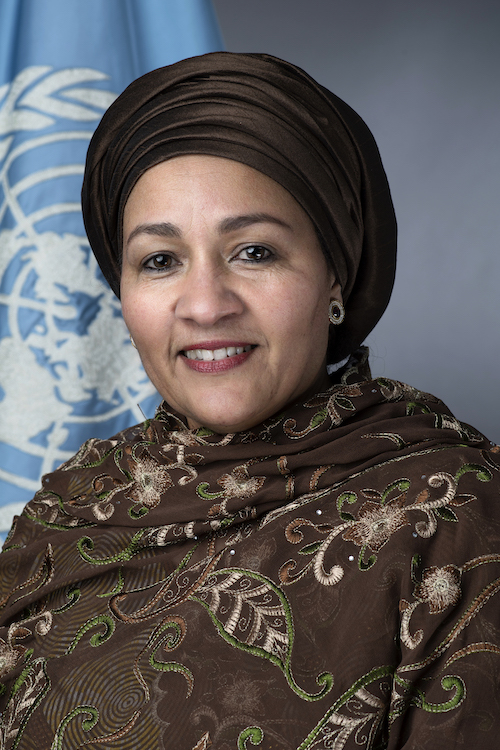Ms Amina J Mohammed UN Deputy Secretary-General is expected to tackle the importance of climate change and investing in Africa when she delivers the Royal African Society 2021 Annual Lecture later this month.

Official Portrait
Credit: UN
Founded more than 100 years ago, the Royal African Society believes the world would be ‘a more equal, just and interesting place if African perspectives had a central position in global conversations.’ Case in point is climate change. One of the most topical issues right now, a key aim of the recently concluded COP 26 was: “how to assure a just energy transition for poor and developing countries, including those in Africa, in the face of growing challenges from climate change and economic inequality.”
To mark the Royal African Society’s 120th Anniversary, DSG Amina Mohammed will deliver the 2021 Annual Lecture on ‘Africa in a just transition – Investing in a sustainable recovery.’
Okonjo-Iweala makes history as first woman & African to head the WTO
At the centre of discussions during COP26, Nigerian-born Mohammed who has held positions as a minister for the environment in Nigeria and a number of roles at the United Nations recently shed light on her ideology around climate change during an interesting interview with Dia Mirza on social media.
During the interview Amina Mohammed talked about the foundation of her interest in climate change which could be traced back to her own childhood while growing up in Nigeria.
Inspired to join our SDG Advocate @deespeak for #DownToEarthWithDee.
Follow it live as we discuss the role of youth in #ClimateAction and what comes after COP26. https://t.co/6P4tWg2oEO pic.twitter.com/9TQfSkitnW
— Amina J Mohammed (@AminaJMohammed) November 16, 2021
The eldest of five girls, Amina Mohammed was born to parents who were public servants. As a child, she moved around many rural areas which gave her an overwhelming sense of community.
According to Mohammed: “running around with no shoes, living in the banks of Lake Chad, gave me a sense of community.” She was born at the independence of her country Nigeria, so that also gave her a sense of possibility and hope.
Her childhood inspired her love for nature, whether it was an urban or rural center, it didn’t matter, as long as she was in harmony with her environment.
When it comes to her ideology on climate change, she gave the example of what it could do to people, such as farmers who have to depend on the land for their livelihood, they are greatly affected by climate change in a personal way that boils down to their livelihood, their family. Their very existence could be threatened by a dust storm. For a farmer, it’s not just a phase in a climate across the year, it obliterates their whole harvest.
“We sometimes forget what a person suffering from climate changes on the land is going through.”
One of the solutions she offered to the problem of climate change and African economies, is to bring the implications of what is happening to political leaders. As the popular saying goes, knowledge is power, so we must all be knowledgeable about those issues. She emphasized that the transition to a green economy involves understanding behind the words of environmental activism and bringing solutions to the table.
Just as the sum total of parts makes a whole, we need to understand that both economic and environmental decisions need to be made together, not one without the other. The key to building a sustainable economy is by working side by side with nature.
Based on lessons learned from COP 26, she posed the question to leaders: “When you’re crossing a ‘T’ or dotting an ‘I’, are you saving lives or losing lives?” She added: “We sometimes forget what a person suffering from climate changes on the land is going through.”
Why African women in business must be central to UK-Africa Summit talks
As much as climate activism and holding leaders accountable is necessary in the restoration of our economy, we also have to remember our own roles as individuals in harmonizing the connection between nature and our economy. In her own words, “The world deserves to be better for people who will inherit it in the future.”
The Royal African Society 2021 Annual Lecture: Africa in a just transition – investing in a sustainable recovery takes place on Monday 29 November 2021, 6pm to 7.30pm.
For more information and to buy tickets click here.












